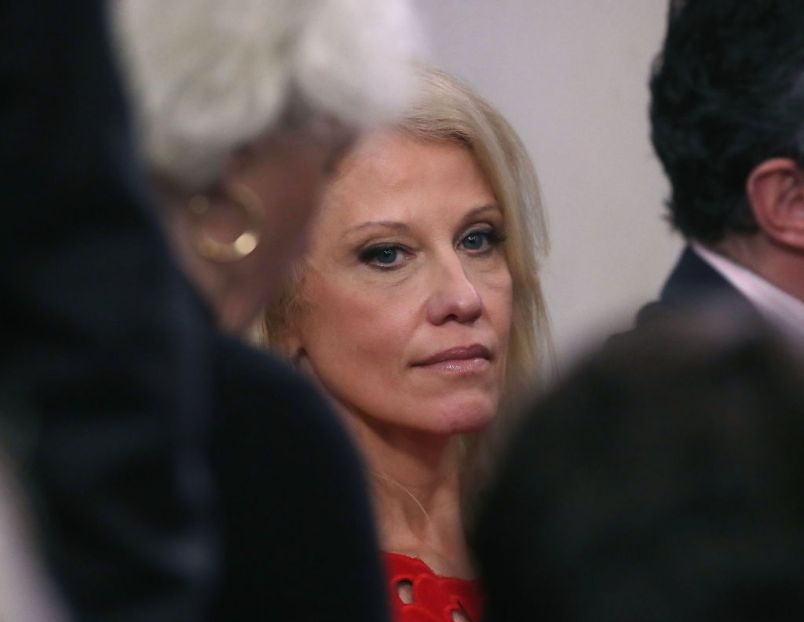Politico reported Tuesday on the frustration expressed by many involved in combatting the opioid death crisis, including Republican lawmakers, over the lack of communication and coordination from Kellyanne Conway, the White House staffer President Donald Trump tasked with tackling the issue.
Specifically, Politico said, legislators who were “accustomed to working with the drug czar office” — the Office of National Drug Control Policy, which from the Reagan administration until now has traditionally coordinated federal drug control policy — “haven’t seen outreach from Conway or her cabinet.”
“I haven’t talked to Kellyanne at all and I’m from the worst state for this,” Sen. Shelley Moore Capito (R-WV) told Politico, adding: “I’m uncertain of her role.”
(Someone with knowledge of Capito’s schedule told TPM she has spoken with Conway since being interviewed by Politico.)
The outlet said that Sen. Rob Portman (R-OH) “echoed” Capito’s concerns, though it noted that Portman’s wife Jane Portman, Conway and first lady Melania Trump attended an opioid event this week.
Sen. Maggie Hassan (D-NH) told Politico: “What we haven’t seen is the kind of coordination of critical programs that ONDCP has traditionally done.”
An unnamed former Trump administration staffer told Politico that, in contrast to the so-called “opioids cabinet” established by Conway, “[i]t’s fair to say the ONDCP has pretty much been systematically excluded from key decisions about opioids and the strategy moving forward.”
Conway said in part, in a statement the White House shared with TPM, that “the opioids cabinet was formed to serve as an interagency coordinating structure on drug demand and drug supply reduction efforts, in furtherance of an Administration-wide plan to focus on treatment and recovery; prevention and education, and; law enforcement and interdiction.”
Politico noted that Conway’s description of her cabinet covers work the ONDCP has traditionally done, and that two political appointees from ONDCP have attended Conway’s cabinet meetings in the acting director’s place — a sign that the office’s expertise isn’t being fully represented.
ONDCP’s acting director, Richard Baum, told TPM in a statement that his office “is the lead Federal entity in charge of crafting, publishing and overseeing the implementation of President Trump’s National Drug Control Strategy.”
“The Strategy goes through a rigorous interagency clearance process in which every affected agency has the chance to review and comment on the document,” he added. “The end result will be a comprehensive, detailed, and unified plan to address the full array of drug problems facing the country.”
“The opioids cabinet,” Baum noted, “is an interagency coordinating apparatus for public-facing opioids-related initiatives, not a policy making shop.”
ONDCP, meanwhile, has been in shambles for much of Trump’s tenure.
A series of stories by the Washington Post exposed and led to the resignation of a 24-year-old staffer, with no relevant qualifications, who at one point was partially fulfilling the duties of the ONDCP’s chief of staff. Politico noted that Baum hadn’t served in the office “for decades” when he was tapped for the position.
Tom Marino, the former congressman whom the Trump administration had tapped to formally take the “drug czar” role, withdrew from consideration in October last year after a bombshell Washington Post and “60 Minutes” investigation found he advocated for a policy that made it harder for the DEA to stop potentially dangerous shipments of opioids.
The office’s senior leadership is down to “a skeleton crew of three political appointees, down from nine a year ago,” Politico reported.
Trump proposed massively defunding the office in his budget last year before backing off, Politico noted, a move that he’s set to attempt again this year.
This post has been updated.







Alabama has the highest rate of opioid prescribing in the country
Oklahoma is the third highest prescriber of long-acting and extended-release opioids
Tennessee was the third highest prescriber of opioids.
Mississippi is the fourth highest prescriber of opioids.
Louisiana is the fifth highest prescriber of painkillers
What pain are they treating? Physical or emotional.
When will the press and the Dems learn that a republican cannot be shamed? Neither can anyone who supports Trump. The entire administration and its supporters are extremely proud of their ignorance, bullying, disregard for the law, racism and misogyny. They’re all like a little kid who’s proud he made doody in the toilet. These are damaged people who don’t give a rat’s ass about anyone else, the US Constitution or anything remotely “fair”.
Gee, you’d almost think keeping millions of poor people in a drugged, zombie-like state is something the Trump administration feels is to their advantage.
Putting Kelly Ass Conjob in charge of the largest public health crisis facing us right now tells you how much these soulless heartless assholes care about it. It’s not like there are no experts in NIH, CDC, and elsewhere. You know, people who actually understand the science of addiction and how opioids are marketed, distributed, etc…?
Conway is not a human being. She is a monster.
The problem is that the DC Dems and Media etc treat her like she is human with human values.
She isn’t.